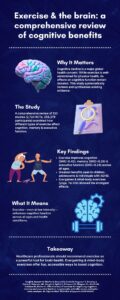Have you ever noticed feeling mentally clearer after physical activity? That post-exercise mental clarity isn’t just your imagination – it reflects real cognitive changes. Our research team undertook a major review of the evidence to dig deeper into exactly how movement shapes our thinking.
What we discovered about exercise and your brain
Our analysis examined data from 133 systematic reviews, including over 2,700 randomised controlled trials (RCTs) and 258,000 participants. The results provide substantial evidence that regular physical activity benefits cognitive function.
The research showed benefits across three key cognitive domains:
- General cognition: overall thinking abilities
- Memory: information storage and retrieval
- Executive function: planning, focus, and multitasking abilities
Particularly interesting were the patterns regarding which populations benefited most and which exercise types showed the strongest effects.
The unexpected winners: children, ADHD and gentle movement
While cognitive benefits were observed across all age groups, children and adolescents demonstrated the most significant improvements in memory. This suggests that physical activity during developmental years may help build cognitive resources.
Interestingly, individuals with ADHD showed the largest gains in executive function—the cognitive domain often affected by this condition. This finding suggests exercise may be a valuable complementary approach for cognitive support in ADHD.
Perhaps one of the most surprising findings related to the intensity of exercise. We’ve all heard of the no-pain-no-gain mantra. Yet, our analyses suggested that, for brain health, low-to-moderate intensity activities may actually be better than vigorous workouts. Exergames (think Wii Fit or VR fitness) and mind-body exercises like yoga and tai chi showed particularly strong effects on cognitive measures compared to traditional more high-intensity workouts.
Duration of effects
If you’re wondering how long you need to exercise before seeing mental benefits, we found something interesting: shorter interventions (around 12 weeks) actually showed stronger effects than longer programs. Your brain appears to respond relatively quickly to new movement patterns. We found this particularly encouraging for those starting a new exercise routine – you don’t need to wait years to experience cognitive benefits.
What this means for you
These findings have practical implications for various populations:
- Educational settings: regular movement breaks may support children’s cognitive development.
- ADHD management: physical activity could complement existing approaches for supporting executive function.
- Aging populations: mind-body practices may help maintain cognitive health in older adults.
- Technology integration: exergames aren’t just fun – they’re actually training your brain along with your body.
Moving your body is one of the most powerful, accessible ways to support your brain health – regardless of your age, current fitness level, or cognitive status.
So, what kind of movement might you try this week? Your brain will thank you for it.
